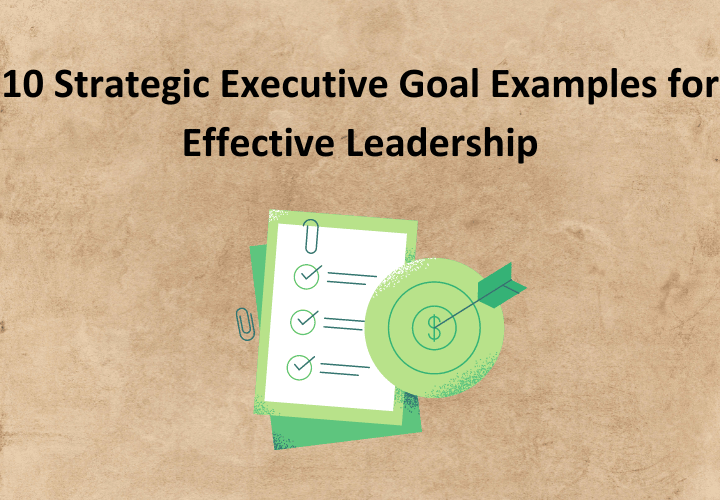A business executive holds many responsibilities to fulfill the company’s expectations and the organization’s success. When we consider effective leadership, the business leader is responsible for company goals, cash flow, handling networking events, and relationship-building with team members.
A successful leader can delegate tasks to employees and can increase employee morale with a supportive leadership style that helps to achieve a team flourish moment.


Like other fields of life business leaders also need to focus on their personal development and professional life to feel valued. And setting goals works best in this scenario which helps to identify ways to succeed.
In this article, you are going to enjoy good development goals and effective executive goals examples for your professional life. But before getting into it let us discuss the importance of leadership goals. Here we go!
Why are leadership goals important?
The word “leader” itself tends to feel valued so, think about how valuable this position is. Good leadership is not an easy thing to pursue, rather it requires additional struggle and strength to maintain this higher level. And like other people, great leaders also need improvement on an ongoing basis in life.
So, there is always a need for personal development and self-awareness for a business leader to feel valued. And a successful leader can achieve progress in professional life by setting some good leadership goals.
Setting leadership goals helps in following different perspectives as it helps in
- Achieving career goals
- Personal development
- Improving leadership skills
- Developing emotional intelligence
- Developing interpersonal connections
- Organization’s success
- Increasing productivity
- Relationship building
- Time management


Why good leadership matters?
Good leadership is enough to make business differences in the workplace. Common leadership mistakes negatively affect employee engagement, employee morale, the hiring process, company culture, and the company’s expectations.
But it is always possible to make a change with the help of effective leadership goals that give favor to effective mentorship. No matter whether you are a leader by birth or managed to build effective leadership skills but there is always a need for development.
A good leader manages to use his/her leadership style to
- Increase productivity of employees
- Identify own strengths
- Deal with pain points
- Get regular feedback from employees
- Build strong relationships with the team of employees
- Provide direct team reports
- Delegate tasks to team members
- Manage business operations
- Track your progress as an employee
- Focus on setting goals for the business team
What Is a SMART Goal?
The SMART goal formula is popular in goal setting and it is applicable in all the different perspectives of goal setting.


A SMART goal represents
S: stands for specific (when you set goals make it specific every time)
M: stands for measurable (always set measurable goals i.e consider when and to what extent…)
A: stands for achievable (make sure to set easy and perfectly attainable goals)
R: stands for realistic/relevant (avoid setting unrealistic goals rather set real goals)
T: stands for time-bound (consider time management and set a time-bound goal every time)
Why Should You Set Leadership SMART Goals?


I hope you understand the importance of setting leadership goals and why leadership goals are important is clear to you now. The SMART goal formula is also discussed earlier and now here are the 5 reasons behind setting leadership SMART goals.
- Setting SMART leadership goals helps in elevating leaders and their business teams
- A SMART goal helps in improving company culture and developing a learning environment
- SMART goal improves leadership skills by enhancing the management style
- SMART leadership goals improve the productivity of team members
- The SMART goal creates a sense of accomplishment for teams members and employees
Apart from these benefits of setting a SMART goal for effective leadership, it is also beneficial for business leaders to consider the SMART goal framework for self-awareness and personal development. Creating goals specifically the SMART goals help to stay focused on career goals and to track your progress.
10 Leadership Development Goals


As human beings, we all make mistakes no matter how perfectionist we are. In the same sense, as far as business leadership is concerned there always exists a need for improvement and growth.
It has been proven that every great leader has achieved their level of dignity through professional development and personal growth. Great business leaders give priority to creating goals i.e. career goals, leadership goals, and personal goal setting.
If you are looking forward to becoming an effective leader you need to set SMART leadership development goals that are perfectly attainable. Here are the 10 important leadership development goals that are necessary for every business leader and business executive.
These leadership development goals are being set after consulting the top business leaders, leadership experts, and company executives. The noticeable thing is that your leadership skills depend upon your personal abilities and way of observing things.
- Become an active listener
A good leader always prefers to listen to all the employees no matter entry-level or C-suite and suggests necessary improvements.
Active listening skills are the basic leadership development goals for a business leader. Listening to team members and other employees and noticing their perspectives on the company is the most important business skill to own.
- Offer constructive feedback that facilitates growth
As a successful leader, you must construct positive feedback for team excellence. Being a business leader your feedback matters a lot to your team and employees. Your feedback should reinforce the performance of employees and create an encouraging environment for the team.
A great business leader always focuses on the improvement areas during feedback and encourages employee growth.
- Focus on Building Relationships
An effective leader is capable of building interpersonal connections for the progress of the company and its employees. Building strong relationships with team members is beneficial for the company’s growth as well as increasing trust among team members.
- Effectively manage conflict
A good leader has the necessary willpower to manage the conflict with their emotional intelligence and leadership skills. A good business leader always understands the reason behind a problem and helps in handling the pain points.
A great leader always prefers listening to the employee and taking constructive criticism to sort out the conflict.
- Be adaptable to change and growth
Never practice behavior that insists you as a perfect leader but always feel open to learning new ideas and development goals. An open attitude toward adapting to change is always helpful in company growth and professional development.
Open-mindedness is crucial in business terms as there comes many situations when there is a need for change in company terms and company culture. So, for a business owner, it is always important to prepare for a new situation.
- Be More Open-Minded
All the team members don’t have the same point of view rather different team members own different perspectives and business ideas. So, a leader should be patient and open-minded to absorb different suggestions and ideas.
Talk to your employees, listen to their opinions, and respect everyone’s perspective to grow your business.
- Be a mentor
A good leader is also capable of effective mentorship. Being a leader you have many things to look after including your team’s growth, the company’s success, and your personal growth. While creating goals make sure to prioritize your team concerns as your team members depend upon your consultancy and guidelines.
A good mentor set effective plans for their team members and company employees. Eliza Nimich a co-founder of Tutor encourages the mentors to work with their team members to evaluate their level of achievement.
- Build stronger working relationships
Strong working relationships are beneficial for both the boss and the employee and it is the major source of trust building.
Admiring the employee for their progress and encouraging more growth is the basic ability of a great business leader. It is effective in employee development and work progress.
- Build dynamic teams
Competitive organizations are comprised of unique teams and quality staff. An effective leader has the ability to identify valuable employees during the hiring process. Great business leaders always prefer quality over quantity and choose the most talented people for their company.
A better leader develops more eclectic teams by considering the company’s requirements.
- Improve Systems for Knowledge Sharing
A good leader never feels hesitant about sharing knowledge with his/her team members. He always feels excited to introduce new systems that are helpful in knowledge sharing.
There are many tools and software that help an executive with business dealings and business growth by providing regular feedback, connecting employees on the same page, and tracking company progress.
Top 15 examples of professional goals


- Practice Confidence
The confidence of leaders motivates the team members and employees which results in active learning and professional growth among employees. So, it is the foremost duty of a great leader to cheer his/her team with own strength and confidence.
A good example: Make a list including your 5 strengths and practice them every day in the workplace.
- Learn to listen
A great business leader must be an active listener, who listens to the different perspectives of team members and give them respect. Active listening is the must-have quality of a business leader that is necessary for employee empowerment and business growth.
A good example: Listen to all the group members and get a weekly progress report of employees on site.
- Learn your limits
A good leader never overdoes rather well aware of his/her limits. What you need to do as a leader is to delegate tasks and trust your employee. Involve in the projects to the necessary extent and avoid extra involvement. It will build the confidence of your employee and increase their trust level.
A good example: Delegate two or three tasks to one of your weekly direct reports
- Set Goals for Structured Improvement
As a business leader, it is very helpful to set goals and make a proper strategy before starting a new project. It will be a good addition if you get the opinions of employees and team members too.
A good example: Set professional goals before each project.
- Develop inclusive leadership and teams
A good leader should focus on creating eclectic teams with his/her great leadership style. Inclusive leadership is the best source to achieve business goals. Make sure to improve the hiring process for company growth.
A good example: Make sure to look after the hiring process and eliminate low-quality staff.
- Find more efficient processes
Always be active toward finding new better ideas for improvement and business growth. An effective leader never refrains from learning new and efficient ways of business success.
A good example: Attend networking events and note down the different perspectives of other members for business progress.
- Build Emotional Intelligence
To become a successful leader try to increase your emotional intelligence to handle the pain points and stress of work.
A good example: Feel happy to help my team members
- Discover Your Team Members’ Personal Strengths
Knowing the pain points and strengths of employee help in delegating the right task that enhances employee performance.
A good example: set up a monthly survey for employees to know their strengths and weakness.
- Develop a Growth Mindset
A growth mindset helps in learning, growing, and identifying opportunities. So, it is beneficial for a business manager and executive to have a growth mindset that leads to a successful business.
A good example: Attend networking events once a week and building one connection at least.
- Practice Time Management
A leader is an embodiment of his employees therefore if you lack time management as a leader then how can you expect punctuality from your employees?
Therefore, for a successful leader, it is the most important thing to be on time and conduct timely meetings with team members. Time management is crucial for managers as they have to manage multiple projects at once.
A good example: Conduct timely meetings with team members at the end of the week.
- Show Up Early to Virtual Meetings
While conducting virtual meetings try to be the first person on screen as it will activate other team members and increase employee engagement.
A good example: Activate the meeting 5 minutes earlier every time.
- Build Internal Talent
A leader is a source of encouragement for his/her employee and responsible for the career progression of the employee. To be mindful and active needs a growth mindset and internal talent, so, a leader always prefers his/her personal development.
A good example: Sing in a professional development course this month.
- Develop efficiency
To become more efficient you need to spend more time on your personal development and learning professional skills. But once you become efficient you will feel valued and confident about your dealings and responsibilities.
A good leader always tends to improve their efficiency for both their personal improvement and leadership development goals.
A good example: Evaluate my weekly performance as a leader and identifying ways to improve my leadership skills.
- Improve your emotional intelligence (EQ or EI)


Successful leaders are God gifted with high emotional intelligence(EI) and there are five pillars of EQ including
- Self-awareness
- Self-regulation
- Social skills
- Empathy
- Motivation
These traits help in coping with work stress and taking the right decisions for the well-being of the company and business.
A good example: write the pain points and noticeable things that happened at the workplace in your daily journal and examine how you have dealt with those situations.
- Seek Feedback from the Team
Always make sure to collect feedback from your team it will help you to track your progress and business progress.
A good example: set a weekly schedule to get the required feedback from team members during a meeting.
Conclusion
A business executive owns a high level of accomplishment and is responsible for company growth and business improvement. In fact, the company revolves around the services of an executive. Therefore, for a great business leader, it is always necessary to put effort into his/her professional growth.
I hope you enjoy the read and it will be helpful for you to set leadership goals for a successful business.
FAQ’s
What are executive goals?
An executive is accountable for the company’s expectations therefore a successful leader requires to achieve the following important executive goals.
- Building strong relationships
- Effective leadership skills
- Ability to deal with pain points
- A resilient management style
- Developing interpersonal connections
- Producing eclectic teams
- An active listener
How do you set goals for executives?
An executive follows the following different steps with his/her emotional intelligence to set leadership goals.
- In the first step, the business leader manages to set several goals
- Identify the difference between long-term goals and short-term execution
- Managing goals under an easy eye view
- Provides focus on important business objectives
- Tracks goal progress of team members and company
What are good leadership goals?
- Practice active listening to employees
- Build eclectic teams
- Delegate tasks to each team member
- Manage networking events
- Relationship building with employee
- Support employee morale
- Stay focused on company growth
- Prepare direct reports
- Think of effective business ideas
- Collect regular feedback
What are examples of smart goals for leadership?
- Arrange weekly business meetings with team members to get positive feedback
- Arrange monthly team presentations to improve the active listening skills of employees
- Introduce new business software to evaluate company progress.
- Make the hiring process easy by setting quality requirements
- Enhance emotional intelligence in employees by assigning them different tasks on weekly bases
- Focus on business operations for daily company growth



